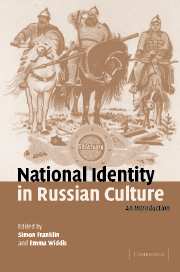Book contents
- Frontmatter
- Contents
- List of illustrations
- Notes on contributors
- Preface
- Note on the transliteration of Russian
- Map: The growth and contraction of Russia and its empire
- 1 ‘All the Russias …’?
- SECTION I IDENTITIES IN TIME AND SPACE
- SECTION II CONTRASTIVE IDENTITIES: ‘US’ AND ‘THEM’
- SECTION III ‘ESSENTIAL’ IDENTITIES
- SECTION IV SYMBOLS OF IDENTITY
- Afterword
- Notes
- Selected further reading in English
- Index
Afterword
Published online by Cambridge University Press: 04 May 2010
- Frontmatter
- Contents
- List of illustrations
- Notes on contributors
- Preface
- Note on the transliteration of Russian
- Map: The growth and contraction of Russia and its empire
- 1 ‘All the Russias …’?
- SECTION I IDENTITIES IN TIME AND SPACE
- SECTION II CONTRASTIVE IDENTITIES: ‘US’ AND ‘THEM’
- SECTION III ‘ESSENTIAL’ IDENTITIES
- SECTION IV SYMBOLS OF IDENTITY
- Afterword
- Notes
- Selected further reading in English
- Index
Summary
In a posthumously published essay which has come to be known as ‘The Author's Confession’ (Avtorskaia ispoved), Nikolai Gogol writes of his quest to discover Russia as he was working on his novel Dead Souls. It was a quest conducted mainly while he was living abroad. Gogol explains the problem, brought into focus by his two trips back to Russia in 1839 and 1841:
Twice I returned to Russia […] but the strange thing was that in the midst of Russia I could barely see Russia […] I noticed that almost everybody had formed their own Russias in their own heads. Hence the interminable arguments. That wasn't what I needed at all. […] Throughout my stay in Russia, in my head Russia disintegrated and dissolved. I couldn't gather it up as a whole. […] but as soon as I departed from it, it put itself back together again in my thoughts.
Gogol was relieved when Russia ‘put itself back together again’ in his thoughts. He needed an integral vision of Russia, one that made sense, one that was … one. He needed a unitary vision of Russia to suit his purposes. Unitary Russias do tend to be projected for a purpose. They come with political or social or moral agendas. Unitary visions of Russia imply prescription rather than description, what people should think rather than what they do think, what people should become rather than what they feel or believe themselves to be.
- Type
- Chapter
- Information
- National Identity in Russian CultureAn Introduction, pp. 217 - 218Publisher: Cambridge University PressPrint publication year: 2004

